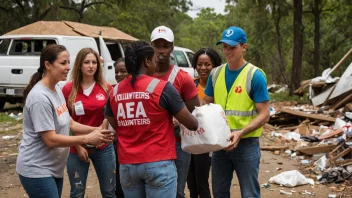Traveling to new countries can be an exhilarating experience filled with the promise of adventure and discovery. However, it also comes with its own set of challenges, particularly when it comes to communication, especially in emergencies. Effective communication can be the difference between a minor inconvenience and a serious situation when you're far from home. This comprehensive guide aims to equip you with the essential knowledge and strategies to navigate communication barriers during emergencies abroad, ensuring that you remain safe and informed.
Understanding the Importance of Communication in Emergencies
Communication is critical in any emergency situation, whether it's a medical crisis, natural disaster, or a personal safety threat. In a foreign country, the ability to communicate effectively can greatly influence the outcome of the situation. Here are some key points to consider:
- Immediate Response: In emergencies, every second counts. Having a way to communicate can expedite help and ensure that you receive timely assistance.
- Access to Information: Knowing how to ask for help or information can guide you to the nearest hospital, police station, or embassy.
- Emotional Support: In distressing situations, being able to communicate with loved ones back home can provide comfort and reassurance.
Pre-Trip Preparations
Before you embark on your travels, it's crucial to prepare yourself for potential emergencies. Here are some steps you can take:
Research Local Emergency Numbers
Different countries have different emergency numbers. Familiarize yourself with the local emergency contacts, such as:
- Ambulance
- Fire Department
- Police
- National emergency services
Make sure to write these numbers down and keep them accessible at all times.
Learn Basic Phrases in the Local Language
While it’s not necessary to be fluent, knowing a few key phrases can be invaluable. Here are some essential phrases to learn:
- Help!
- I need a doctor.
- Where is the nearest hospital?
- Call the police!
Download Translation Apps
Utilize technology by downloading translation apps such as Google Translate or iTranslate. These can assist in overcoming language barriers during emergencies. Make sure to download offline language packs in case you do not have internet access.
During Your Trip: Communication Strategies
Once you've arrived at your destination, it's important to have strategies in place for effective communication in emergencies.
Use Your Mobile Phone Wisely
Your mobile phone can be a powerful tool in emergencies. Here’s how to use it effectively:
- Local SIM Card: Consider purchasing a local SIM card to ensure you have access to local networks and emergency contacts.
- International Roaming: Check with your service provider about international roaming plans that allow you to call emergency services.
- Emergency Apps: Download apps that can help in emergencies, like emergency alert systems, location tracking, or local government apps.
Establish a Communication Plan
Before leaving, establish a communication plan with friends or family. Share your itinerary and ensure they know how to reach you if needed. Consider using:
- Regular Check-Ins: Set a schedule for regular updates via text or social media.
- Emergency Contacts: Designate a point of contact in your home country who can help relay information if necessary.
Utilizing Local Resources
In foreign countries, local resources can be extremely helpful. Here are a few to consider:
- Hotels and Accommodations: Staff at your hotel can provide assistance in emergencies and may speak English.
- Local Authorities: Don’t hesitate to approach local police or security personnel for help.
- Expat Communities: Connect with expatriates or local guides who can provide support and insights.
Dealing with Specific Emergencies
Different types of emergencies may require different communication strategies. Here are some common scenarios:
Medical Emergencies
In case of a medical emergency:
- Clearly communicate your symptoms to healthcare providers, using basic phrases or a translation app if necessary.
- Know the location of the nearest hospital and how to get there.
Natural Disasters
Natural disasters can occur unexpectedly. Here’s how to prepare:
- Stay informed through local news outlets or social media.
- Follow instructions from local authorities regarding evacuation or shelter.
Personal Safety Threats
If you find yourself in a threatening situation:
- Seek help from nearby people or businesses.
- Use your phone to call emergency services or your country's embassy.
Post-Emergency Communication
After an emergency, it’s important to assess the situation and communicate your status:
Check on Loved Ones
Let your family and friends know you are safe, especially if they are concerned about your well-being.
Seek Support
Consider reaching out to local support services for psychological assistance if needed.
Conclusion
Traveling abroad should be a thrilling experience, but being prepared for emergencies is essential for your safety and peace of mind. By understanding the importance of communication and taking proactive steps before and during your trip, you can navigate emergencies effectively. Remember to research local emergency numbers, learn basic phrases, and utilize technology to enhance your communication capabilities. Most importantly, stay calm and collected during emergencies, as this will help you think clearly and seek help more efficiently. With the right preparation, you can ensure that your travels are not only adventurous but also secure.






